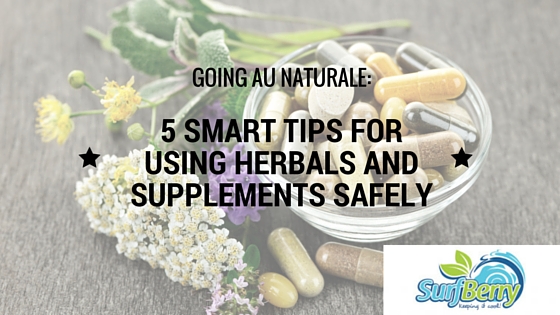
The dietary supplement market (which includes vitamins, minerals, herbals, botanicals, amino acids, enzymes, and many other products) is a-boom in the US. Well over half of Americans report using at least one dietary supplement. In 2012 alone, we spent an estimated $32 billion on supplements, and we’re projected to spend a whopping $60 billion by 2021.
One of the key reasons that dietary supplements are so popular is because we generally perceive them as “natural” and “safe”–especially when compared to conventional prescription or over-the-counter drugs. As a pharmacist and health coach I have a simple goal with clients who take any pharmacologically active substance–including herbs and supplements: to ensure that any benefit clearly outweighs possible risks.
Just because it’s natural and you can only buy it at a health food store, does NOT mean that it’s safe for you. I’m all for natural and alternative approaches to achieving our best health. I love my turmeric, fish oil, probiotics, and vitamin C. In fact, I sometimes describe myself as an “anti-pharmacist” because I love to help people avoid, reduce, or eliminate their need for pharmaceuticals whenever possible. But what many folks don’t realize is that herbs and supplements can have side effects, some of them potentially dangerous, especially when combined with other medications or when used in the presence of certain health issues such as high blood pressure, heart disease, anxiety, just to name a few.
For example, St John’s Wort (SJW) is a very popular herbal remedy for mild to moderate depression and other conditions. Although some studies have indeed shown SJW to be quite effective, research also shows that SJW interacts significantly with a number of commonly used medications. In women taking oral contraceptives, for example, the use of SJW can actually reduce the effectiveness and can result in breakthrough or irregular bleeding, and even unintended pregnancy. And SJW can either increase or decrease the levels of commonly used medications including certain antihistamines, statins (cholesterol drugs), analgesics, and a laundry list of other drugs because it interferes with a key drug-clearing powerhouse in our livers. And, if taken in combo with other antidepressants or medications that also affect serotonin, some pretty nasty symptoms collectively known as “serotonin syndrome” can occur. Trust me, you don’t want that. Other commonly used herbals like ginseng, ginkgo, and valerian can interact or have additive effects when used with other medications.
In general, the FDA regulations for dietary supplements are different from those for prescription or over-the-counter drugs. Unlike drugs, which must be approved by the FDA before they can be marketed, dietary supplements do not require premarket review or approval by the FDA. Although the supplement company is responsible for having evidence proving the safety and effectiveness of their products and for ensuring that label claims are truthful and not misleading, they do not have to provide that evidence to the FDA before the product is marketed.
Due to this relative lack of scrutiny, we have to be extra smart about supplement shopping. Here are 5 tips for making informed decisions about dietary supplements:
- Do a bit of research. A great (and free!) place to check first is the National Center for Complementary and Integrative Health (NCCIH) database. It offers an evidence-based description of supplements, their use(s), effectiveness, safety, and possible adverse effects.
- Look for proof. If you’re feeling extra smarty-pants, do a little search on PubMed, a free service that houses more than 25 million articles that have been published in the biomedical literature. Geeky, maybe, but at it’s pretty easy to use and you can read any abstract for free, and often, the full journal article. What you hope to find are actual randomized, controlled clinical trials on the supplement in question, meaning that it’s been tested against a placebo or other intervention.
- Look for third party validation, like Good Manufacturing Practices (GMP). Sometimes this won’t be found on the bottle, but you can go to a company’s website to see if they have GMP certification. For example, I take a vitamin C product made by Garden of Life. I went to their website before purchasing and found that they work with a number of third party organizations to ensure purity, quality, and accurate labeling. Note that GMP does not assess effectiveness or safety.
- Seek clean. Look for supplements that are free of preservatives, fillers, dyes, and common allergens like gluten and yeast.
- Ask for help from a pharmacist or other knowledgeable source. Especially, especially, especially if you have a health condition or are already taking prescription or over-the-counter medicines. Find someone who is willing to take the time to answer your questions, and if they don’t know the answer right away, then they are willing to do some digging in the medical literature for you. I don’t pretend to know everything about dietary supplements, but I know how to search the scientific literature and to distinguish good science from bad, hype from heft. I’m certainly not knocking the mega-chain supplement purveyors, but too often their retail employees know very little about the effectiveness, safety, and interaction potential of their products.
In short, don’t start popping the SAMe or kava kava solely because it worked so well for your friend’s sister. Check into any product before you put it into your body. Just because you don’t need a prescription for it doesn’t mean it’s free of risk.


